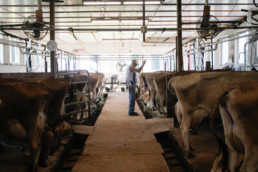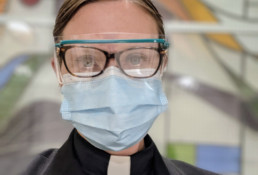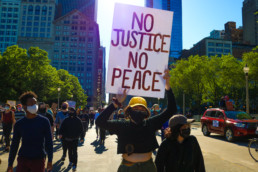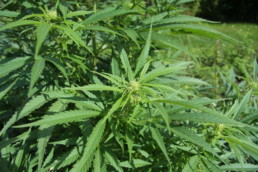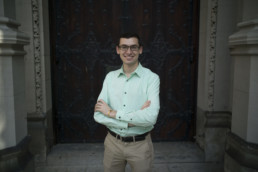Christianity and natural farming in the Hudson Valley
Christianity and natural farming in the Hudson Valley
Sara Badilini
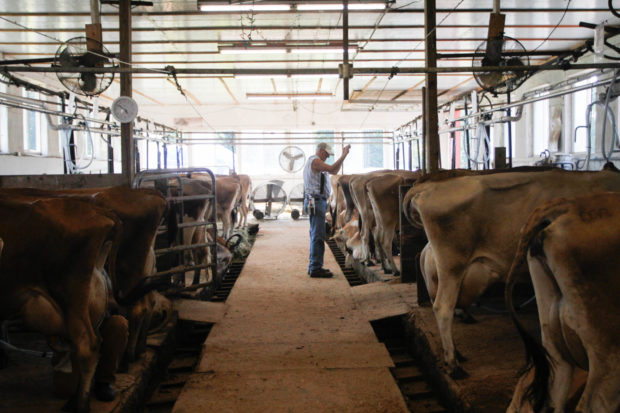
A tall wooden cross and an American flag announce the entrance to “Freedom Hill Farm,” in Otisville, a rural village in Orange County, N.Y, that is north of the city, but not quite upstate.
The owners of this 50-acres , Rick Vreeland and his wife Julie Vreeland, are born again Christians. By combining the principles of natural farming with those of Christianity, they hope to fulfill their mission of sharing the Gospel with others.
“We don’t own the farm, we simply take care of it,” said Rick Vreeland, 67. “It belongs to God.”
The cows and their calves mooing in the barn are the soundtrack of this holy land, which is dotted with colorful signs singing God’s praises.
Jewish, Muslims, Hindus, Sikhs and even atheists visit the farm frequently as well however, shopping their products and asking questions about the owners’ faith.
From the cows’ milk, the Vreelands produce yogurt, buttermilk, and kefir that they sell and distribute in retail locations from Albany to Brooklyn.
All of the employees — two full-time, five part-time — and the several volunteers are Christians. “We don’t ask for it, but God seems to send us only other Christians,” Julie Vreeland, 64, said.
Faith hasn’t always been so central to the Vreelands.
Julie Vreeland grew up in Otisville in a Roman Catholic family, but she “unconsciously fell away from religion,” right after receiving the sacrament of confirmation, at the age of 13.
Rick Vreeland never stepped into a church until he turned 38. “Everything changed that year. I was crossing a yard and I heard a voice telling me ‘You have to go to church,’” he said.
He doesn’t know why God picked that particular moment of his life to speak to him, but ever since, he has dedicated his life to what that voice called him to do.
After growing up on the family farm, not far away from where Freedom Hill Farm is today, he started farming in 1972, when he opened his own commercial farm with a colleague. His wife joined him in 1975, after they got married. Together they worked on their commercial farm for 26 years with more than 2,000 cows.
Despite the success of their business, they decided to quit and four years later they opened Freedom Hill Farm. The barn had been a property of the Vreeland family since the 1930s. After farming it for generations, the dairy farm shut down in the 1960s, and the barn sat empty until May 2007, when the Vreelands opened Freedom Hill and nine milking cows started calling the barn home.
“Before renovating the place we had been praying for years,” JulieVreeland said. “I wanted to do something for Jesus, but didn’t know what.”
Then they came up with the idea of a small dairy farm that could also be a Christian ministry for the youth.
The Vreelands understood they made the right choice when they met their neighbors, who run the Freedom Farm Community, a nonprofit that also happens to be a Christian ministry for young people in the form of an organic farm, where they grow tomatoes, cilantro, pumpkins and all sorts of vegetables.
Edgar Hayes, the nonprofit’s executive director, remembers when the Vreelands knocked on the door and announced the plan for their land. The Vreelands and Freedom Farm Community still cooperate today.
“We have our own program for the youths and they’re really busy with the dairy farm, but their cows come on our land, and we share a mission,” he said.
Lou Enoff, president of the Christian Farmers Outreach — a program based in Maryland that supports Christian farmers around the world with different initiatives — explains the connection between farming and Christianity using the parable of the sower explained in Matthew’s gospel.
“To sow the seeds of the gospel you talk to people to tell them about Christ,” Enoff, 78, said.
Christian farming became a popular concept in the United States in the 1980s. To respect God’s creation, devoted farmers started promoting organic agriculture and unprocessed foods, as opposed to more industrialized products, Enoff said.
Some Christian farmers gathered in organizations such as Christian Farmers Outreach, and the Christian Farmers fellowship. Others, like the Vreelands, carry out their Christian mission on their own.
“Once the seed is planted, if it falls on good ground, it grows and produces crops,” Enoff said. “If it falls in the weeds, then the weeds can choke it out. It's similar to evangelism.”
Today, the Vreelands own 36 milking cows and have around 1,000 clients, who come to the farm once or twice a week to collect their order or raw milk. Freedom Hill is one of only a few farms that sells raw, unpasteurized milk and products. They believe that producing whole foods, while respecting their animals and caring for the land is what makes their farming Christian.
The days at Freedom Hill Farm start early. Julie wakes up at 3.30 a.m., checking the milk orders, while her husband starts the day at 4 a.m. Once they are both awake, they study the Bible for about an hour before heading out into the fields.
“We pray for the cows, the land, the people we know. And we pray every day for divine meetings here at the farm,” said Rick Vreeland.
By 5 a.m. he is milking the cows, while his wife feeds the goats. The rest of the farm soon comes to life. The couple’s son shows up to gather the products and deliver them to the retail locations, and the store manager arrives to open the shop. Other employees and volunteers work in the barn, others fill the milk, and one makes the yogurt — which includes the pasteurization process, the culture of the yogurt with bacteria, and a 10-hour setting.
In the early afternoon Julie Vreeland takes the calves from the barn into the adjacent meadow, followed by some young visitors. Each child leads their own calf with a rope, teaching the calves how to follow instructions. One of them struggles more than others when a stubborn calf refuses to follow the young girl’s lead.
When bigger groups of young visitors come the Vreelands organize afternoon activities and games to entertain them, always starting with a prayer. But the rest of the time with the children is dedicated to games and activities, it’s not meant to be a religion class, explains Julie. Vreeland.
“We don’t want to overwhelm the children with a lesson on faith, we want them to witness our faith through natural farming. But when the subject of religion comes up we are happy to speak about it,” she said.
The Vreelands say they have found a way to combine the farmers’ lifestyle with the Christian ministry, but they don’t belong to any particular branch of Christianity. After trying a number of churches and denominations, they’ve found their own way to worship and praise God.
They hold weekly Bible study gatherings at their home — now on hold because of the pandemic. They also pour their faith and Christian values into how they care for the cows.
As they explain, one of the basic needs for cows to thrive is comfort. That’s why the cows at Freedom Hill Farm stay in the barn only while they’re getting milked and they spend the rest of their day in the fields, where they can take a dip in the pond and lay down.
That heavenly environment for the livestock prolongs their life expectancy, Rick Vreeland explains. On average, the cows at Freedom Hill live around 10 years, he says as he caresses the back of a cow whose box is in front of a poster of “The Last Supper” by Da Vinci, hanging on the barn’s wall.
“You cannot just go to church and think you’re going straight to heaven,” Rick Vreeland said. “You have to be born twice and then you secure yourself a place in heaven. This, instead, is cow’s heaven.”
“The Whole Situation was Soaked in Love”
“The Whole Situation was Soaked in Love”
Lucy Soucek
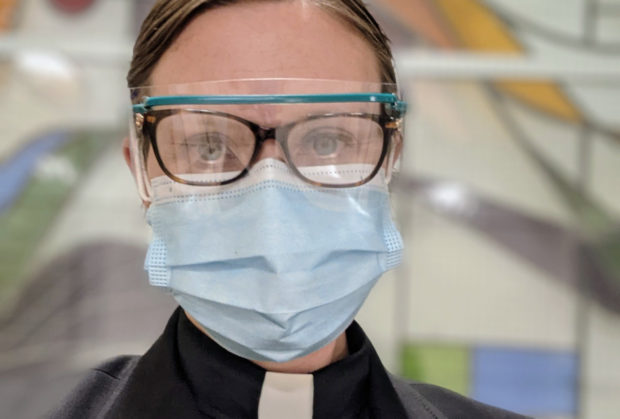
When Hope Fried first received the text from her staff chaplain, she burst into tears. Pacing her Manhattan apartment, her mind was racing. It was spring of 2021 and she was working the on-call shift of her chaplaincy residency at nearby Mt. Sinai hospital. The message came in at around nine in the evening explaining that a mother in the labor and delivery unit was preparing to give birth to a baby either stillborn or expected to pass away soon after birth. The mother was Roman Catholic, Spanish speaking, and she was asking for her child to be baptized.
Fried, 32, is Jewish. Normally, she would have called for a Catholic priest to conduct the baptism, but this was during the overnight shift. If the baby was born alive and they waited for the priest to make it over to the hospital, they ran the risk that the baby might die before the priest arrived.
Fried wasn’t allowed at the hospital during the overnight shift because of Covid restrictions. She had never been to a Catholic baptism, and now she would have to talk a doctor or a nurse through one from her living room on the phone in Spanish in the middle of the night during a pandemic. After her initial bout of panic, she realized that she had a choice to make. And that choice was experienced by many chaplains over the past year and a half.
“COVID made it so that in the times where you would call for a priest or you'd try to call for an Imam, that wasn't available,” said Fried. “So it asked more of us because just the logistics weren't really possible. I think a lot of chaplains were like, okay, we just have to show up with our full humanity.”
In hospitals across New York City, pandemic restrictions have forced chaplains to navigate novel and potentially uncomfortable situations in their attempts to administer care. But what has guided them through the last year and a half is training that prepares them to honor the belief systems of their patients, even when those belief systems are dramatically different from their own. Now, chaplains and chaplain educators are focusing on how to care for themselves so that they can care for others as they continue to practice both in person and remotely.
For Fried, growing up in a multi-religious household influenced her eventual path to chaplaincy. Her mom is Catholic and her dad is Jewish. Ever since she was young, she’s felt more connected to Judaism, although she’s never had a strong belief in God. That’s where her humanism comes in. She identifies as a Jewish Humanist, which means she is ethnically Jewish, but in terms of spiritual beliefs, she doesn’t believe in a higher power.
When deciding what she wanted to pursue in her career, religion felt important. She thought, if she was meant to become a rabbi, God would reach out. But that just never happened. And so she turned to chaplaincy. It was a way for her to still feel connected with her faith, despite not believing in a higher power, and it allowed her to just sit with people and help them navigate hardships.
“I thought, ‘maybe I should try chaplaincy,’” said Fried. “It doesn't have to be super religious, but you get to be with people; you get to accompany people.”
She attended Union Theological Seminary, graduating in the spring of 2020. After taking four units of Clinical Pastoral Education to become board certified and participating in a yearlong residency. She is now a staff chaplain at the Hospital for Special Surgery in Manhattan.
It was during her residency that she navigated the baptism. And so on that night, Fried spoke with the doctor, who also happens to be Jewish, and they decided to make it happen. “We were both very firm,” Fried said. “I remember that feeling of being really grounded in our intention of like, we've been asked to do this; we are going to do this.”
After they made the decision, it was all about talking through logistics. Fried’s staff chaplain and clinical supervisor emailed her a guide to performing an emergency baptism, with details outlining the protocol, sample prayers and information on how to provide support over the phone.
She didn’t know Spanish, so she pulled up YouTube videos and practiced it with her husband over and over again, then walked the doctor through the ritual instructions on the phone. The doctor would need a little pill cup of sterilized water, which would act as holy water. Typically, holy water is water that has been blessed by a member of the clergy, but in the hospital, the protocol is different.
Dabble water on the baby’s forehead, and say:
“[Patient’s name,] Bautizo a ti en el nombre del Padre,” [I baptize you in the name of the Father].
Drop of water.
“y del Hijo.” [and the Son].
Drop of water.
“Y del Espiritu Santo,” [and the Holy Spirit].
Drop of water.
“Amen.”
The baby was born at around 4:30am, alive. A nurse performed the baptism, though Fried doesn’t know their personal religion or language preference. And then, at 4:45am, Fried called the on-call priest to come to the hospital to bless the baby and provide an official document. The baby survived for a couple of hours and then died later that morning.
In the Catholic church, baptism is seen as a way to cleanse infants from the original sin they were born with, and to welcome them into the Catholic faith. So Fried says the family was deeply appreciative that they were able to perform the ritual and receive the certificate.
“I think sometimes we attend to the worst moments in people's lives,” said Fried. “We try to be present and accompany and we try to lessen, slightly, their spiritual distress, and I think having their baby baptized was able to slightly lessen some of that spiritual distress.”
Throughout this whole situation was the tension between Fried’s Jewish Humanism and the Catholic ritual that she was being asked to lead someone through. But Fried, relying on what she learned about being a hospital chaplain where they often have to navigate interfaith situations, thinks of it as an expression of love.
“If a family has this request and this is their ultimate expression of love and will provide some sense of spiritual relief to know that their baby has been baptized and blessed by God and will be accepted into heaven, I think that's an ultimate expression of love and I will perform it,” said Fried.
Hospital chaplains navigate these complicated situations every day, but many also benefit from a system of training called Clinical Pastoral Education that is in place to guide them. During her yearlong residency, Fried was guided by her education supervisor, Rev. David Fleenor. He is the director of education for the Center for Spirituality and Health and the Assistant Professor of Medical Education at the Icahn School of Medicine at Mt. Sinai. He is also ordained as an Episcopal priest.
One idea that Fleenor, 46, taught Fried to keep at the forefront of her mind was to think about the context of the situation and how that determines her role as the chaplain. For Fried, the pandemic, the timing of the birth, the support she received from educators and other chaplains, and the importance of this ritual to the family all drove her decision to make sure it would happen.
“The whole situation was soaked in love,” Fleenor said. “People have their own convictions, but the beautiful work that she did was to dig deeper within herself and find that love was a deeper value; that love and care and compassion compelled her more to facilitate this meaningful ritual for this family, at such a profound time of loss in their life.”
Profound loss was ubiquitous throughout the pandemic. And hospital chaplains spent much of their time caring for not only patients and families, but staff as well. At Mount Sinai, chaplains had the option to administer care throughout the pandemic in person, and many did. Fleenor said their role of caring for staff at the hospital was vital and is too valuable for the field to be replaced by services done over the phone.
“What happens with chaplains is that they are embedded on units and they walk around and staff informally say, ‘Man I'm really struggling,’” said Fleenor. “They're not necessarily gonna reach out to the employee assistance program. But when the chaplain happens to be there, then they open up.”
But to be able to provide staff support, hospital chaplains also need to know how to take care of themselves.
At Robert Wood Johnson University Hospital in New Brunswick, New Jersey, the staff chaplains were able to administer care in person throughout the pandemic, just not in the rooms of COVID-19 patients. Figuring out how to sustain care and avoid compassion fatigue is now one of their primary concerns.
“It’s like everyone's taking a vacation or is sick or something,” said Rev. Christine Davies, ordained Presbyterian minister and the director of pastoral care at Robert Wood Johnson. “They're all dropping like flies just because of the sheer amount of suffering that they witnessed; It’s unparalleled. And so I think they’re still carrying a lot of that.”
Davies, 38, teaches Clinical Pastoral Care Education courses as well, and she says that much of what she teaches her students has to do with learning how to maintain their own emotional wellbeing so that they can care for others. Especially after this past year.
“Even right now, when we're not in a surge, I'm cognizant of my students’ cumulative exhaustion since the pandemic started,” said Davies. “A lot of it is helping them to see and acknowledge and be aware of their own feelings and emotions so that they can honor the emotions in others.”
For Fried, practicing chaplaincy during the pandemic will stay with her for a long time, and she’s learned to recognize when she might not be able to give the care she wishes she could. “I think it just really made me aware of how long lasting the intensity of the pain that we're asked to witness and hold is, and that that can become sort of ingrained in your body and needs to be processed over a longer period of time,” Fried said.
When she got home from her shift the day after the baptism, her husband ordered her favorite takeout dish, Pad Thai, and she spent the afternoon watching The Real Housewives and taking moments to cry. Fleenor and she have a running joke that she’s the crying chaplain.
“Your body needs to release the anguish and the fear and uncertainty,” Fried said. “All that needs to come out, and my way is through crying.”
From the streets to the sanctuary
From the streets to the sanctuary
Kayla Steinberg
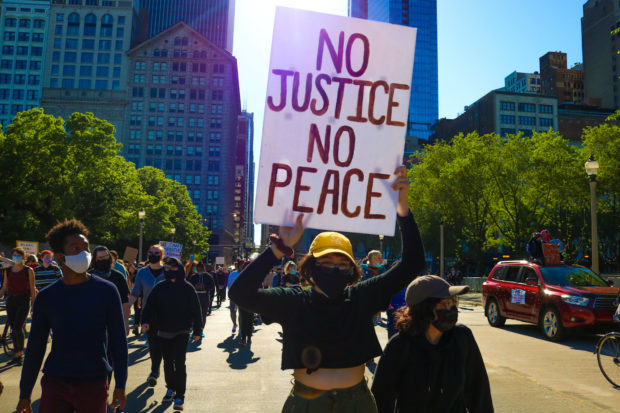
Don Abram was something of a prodigy growing up in his church in Chicago. As a 14-year-old in an oversized pinstripe suit, Abram preached from the pulpit of the Greater New Mount Eagle Missionary Baptist Church for the first time. When he finished, the crowd was on its feet.
But after he publicly came out as queer, Abram, 27, said he lost speaking invitations from pastors. One person even revoked an invitation.
Abram said the pastors offered seemingly innocuous excuses, like scheduling conflicts. But he thinks they silently were uncomfortable with his expression of his sexuality. “They just don’t say the quiet part out loud,” said Abram.
Elements of the Black church certainly have a problem with individuals who identify as LGBTQ+. But after the murder of George Floyd at the hands of a white Minneapolis policeman and the nationwide protest movement that resulted, Abram believed there was an opportunity to help his community.
“I saw a renewed interest among the Black church to start having conversations around intersectional justice,” he said. “I thought that it was an opportune time for the Black church to recommit itself to freedom, liberation and justice for all of God’s children, including LGBTQ+ folks.”
So, Abram took to the streets.
He trekked to protests across Chicago, feet hurting, carrying a cardboard sign that read, in black letters, “SILENCE IS VIOLENCE.”
Abram refused to be silent. It was his spiritual beliefs — his belief in human dignity, a belief that all of us are children of God — that brought him to protest.
“It’s not just a cis, straight Black man who needs to be advocated for,” said Abram, who earned his Master’s of Divinity at Harvard but was never ordained by a church. “It’s also women, it’s also queer folk, it’s also differently abled folks.”
He wanted to make an effort to include them in a space he knows well: the Black church.
In March, Abram launched Pride in the Pews, an organization dedicated to the inclusion of LGBTQ+ people in the Black church. For its “Can I Get a Witness” project, Pride in the Pews is collecting 66 stories of queer Christians in the Black church, corresponding to the 66 books of the Bible. Abram hopes those stories will inspire change.
And change might be happening elsewhere. Earlier this month, the African Methodist Episcopal Church, one of the largest Black Methodist denominations in the world, voted to create a committee that will study LGBTQ+ matters.
Dr. Teresa Fry Brown, the fourteenth historiographer of the AME Church, said the church has been discussing LGBTQ+ issues on-and-off for a number of years. Now that the AME General Conference passed the resolution, church leaders will look deeply into them.
The committee will study texts that discuss sexuality, hear testimonials from Black LGBTQ+ people within and outside the AME Church and propose legislation addressing the rights of LGBTQ+ people in the AME Church, all by the church’s 2024 General Conference. Abram and Dr. Jennifer Leath, a co-author of the resolution and the pastor of Campbell Chapel AME Church in Denver, spoke about a possible collaboration for the testimonials, though nothing is set just yet.
Leath, a member of the LGBTQ+ community, sees encouraging conversation about how the church views LGBTQ+ individuals as a “defense of my own dignity.” And, she said, “there are many, many others who are like me.”
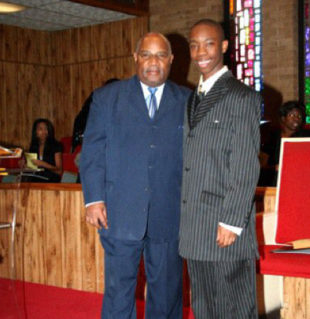
The typical Black church stance toward LGBTQ+ people has been “don’t ask, don’t tell,” said Ronald Hopson, a professor of psychology and pastoral care at Howard Divinity School who teaches about sexuality and the Black church. Of course, he added, LGBTQ+ individuals have always been in the church.
“There’s a kind of anecdotal lore that the Black church would not have music without gay men,” he said.
But being gay has historically been considered a sin, said Hopson. At some churches, those who are openly LGBTQ+ could be ostracized or asked not to participate in a church role. Some LGBTQ+ church leaders might alternatively seek forgiveness from the church and ask to be allowed to continue in their leadership roles. Other LGBTQ+ church leaders might leave altogether, like the late writer James Baldwin, who ministered as a teenager.
Hopson attributes change to Black women in theological education, womanists (who see society and the world through Black women’s experiences) and young people who he said “have not been socialized with the same prejudices and bigotry that two generations of earlier people were raised with.” He considers BLM to be part of this larger, preexisting effort to create change.
The Rev. Vanessa M. Brown also credits young people with shifting the conversation in the church. The pastor and founder of Rivers of Living Water UCC, an LGBTQ+ affirming, “radically inclusive” congregation in the Upper West Side and in Newark, New Jersey, said before the Black Lives Matter movement was born, churches saw an exodus of young congregants who did not want to be part of an institution that wasn’t more inclusive.
“I don’t think Black Lives Matter is driving change,” she said. “It is young people who are helping churches to see that if you can’t open up, if you can’t really be inclusive, then I don’t want to be here.”
Brown, 50, knew she liked girls at around 12 but still married a man. She’ll never forget a conversation with her dad on her wedding day. “My own father said to me, ‘You look beautiful, but you don't look happy,’” said Brown.
She worried about what others would think of her and how it would reflect on her church if she walked away, if she left her fiancé at the altar. So she didn’t. Amid the divorce, which came just months later, Brown decided to leave the church.
But her friends encouraged her to start her own.
“The more you exclude, the more you run people away,” said Brown. “And people are looking for inclusive places to be themselves, whatever that looks like for them.”
But Rivers of Living Water is an exception. Many Black churches today, like Ebenezer Gospel Tabernacle in Harlem, do not fully affirm LGBTQ+ people. That’s a stance they attribute to several Bible passages, like Leviticus 20:13. “If a man lies with a male as with a woman, both of them have committed an abomination; they shall be put to death, their blood is upon them,” the verse reads.
The Harlem church welcomes everyone in prayer but not in leadership, said Jonathan Springer, a minister.
“If you’re preaching or teaching or in a position of authority, and you’re not living a lifestyle that’s consistent with the word, you have to go through a period of reconciliation or you have to step to the side,” Springer, 32, said.
Black Lives Matter has not changed Ebenezer Gospel Tabernacle’s stance on LGBTQ+ issues.
“I don't think that Black Lives Matter has influenced our church to think more reflectively from a theological perspective or from a sociological perspective about LGBT rights,” said Springer.
Hopson interprets Bible passages on sexuality differently. Considering the Hebrew, he said, can make the Leviticus verse about what distinguishes Jews and non-Jews rather than about homosexuality as an abomination. Hopson said some pastors understand that the verse doesn’t necessarily pertain to homosexuality but thinks they don’t want to disrupt harmony in their churches.
Abram hopes to create change on a larger scale — not through the Bible but through a different set of stories, those collected in Pride in the Pews’ “Can I Get a Witness” project. He imagines congregants will sit and listen to the wisdom from the stories, learn from them and create change.
“The same way that those texts and stories teach us about God and how we should relate to one another, the stories of queer and trans folks will teach us about God and how we should relate to one another,” said Abram. “Because our stories are sacred, too.”
Abram said he never believed homosexuality was bad though he recognized there was shame associated with it. He said he had tried to embody a sort of toxic masculinity. But it was more to secure his safety, he said, than because he believed being queer was problematic.
As time passed, he wanted to stand up for the LGBTQ+ community. Abram said so many people can’t be fully who they are because they have internalized anti-LGBTQ+ theologies. “For me, that is not what God has called us to do,” he said. “It is not the life that God wants for us.”
High Life: Christians and Cannabis Legalization
High Life: Christians and Cannabis Legalization
Jessica Mundie
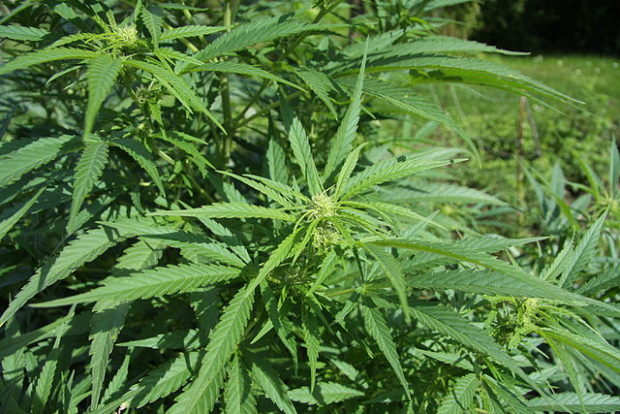
When the Rev. James T. Roberson was a defensive tackle for the James Madison University football team he took part in his school’s pro day, when NFL scouts travel to recruit new talent. But, during tryouts, he pulled his hamstring and had to drop out.
“After that I just started reeling,” he said. Roberson turned to cannabis to numb the pain. Before he would go out for dinner with his friends, he would smoke. Before he went to the movies, he would smoke.
“It got to a point where I was doing it every day,” Roberson, 44, said.
Eventually, Roberson, a pastor’s son, began to examine and question the role faith could play in his life. He was skeptical, he said, mostly of Christianity’s racist and patriarchal elements, but as he read the Bible, he started to pray and grow in his newfound faith.
Eventually, Roberson ended up becoming a pastor at a church in North Carolina. Now he runs Bridge Church NYC in Park Slope, Brooklyn, which he has branded as a “a church for people who don’t go to church.”
Roberson is using his platform as a church leader to talk about the legalization of marijuana and other important cultural issues that are not usually discussed in faith spaces. He does not use marijuana anymore or encourage others to partake, but he, and an increasing number of Black church leaders, see efforts to legalize the controlled substance as a path to religious redemption for Black Americans.
Earlier this year, New York Gov. Andrew Cuomo signed the New York State Marijuana Regulation and Taxation Act, which legalized recreational use of cannabis for people over 21 and made New York the sixteenth state to permit the possession of the controlled substance. The law also allows for those who have been convicted of marijuana related convictions to have their records expunged.
Amid the legalization discussion, Roberson is one of many pastors reconsidering their message about marijuana. Of course, pastors don't want to push a controlled substance from the pulpit, but they see opportunities for economic development in hurting communities, a remedy to historic injustices and a new way to reach lost souls.
For Black religious leaders like Roberson, legalization is an important stepping stone in the fight for racial justice. A report by the American Civil Liberties Union found that in 2018, even though white and Black Americans consumed marijuana at the same rate, Black people were almost four times more likely than white people to be arrested for possession. That disproportionate ratio has not changed even as the overall number of arrests for possession has gone down in the last decade.
“From a legal standpoint, this is a good thing for the Black and brown communities to no longer have this as one of the primary reasons we see Black men disappear into prison,” said Roberson.
His position contradicts how most American clergy feel.
According to a LifeWay Research poll, the majority of Protestant pastors say getting high is morally wrong. Since before legalization, mainstream Christian denominations have had differing opinions on cannabis legislation.
Certain denominations approve the use of medical marijuana, like the Episcopal Church, Presbyterian Church, and United Methodist Church. The Roman Catholic Church considers drug use an offense if it is not used “on strictly therapeutic grounds.” Other religious organizations, like Concerned Women for America, an evangelical Christian group, and Focus on the Family, a conservative Christian ministry, oppose legalization under any circumstances.
Roberson is not the only church leader in New York City considering the importance of social justice and equity in legalization. The Rev. Anthony L. Trufant, senior Pastor of Emmanuel Baptist Church in Clinton Hill, Brooklyn, said he sees the legalization of recreational cannabis as an opportunity for his community to thrive.
In February 2021, the Baptist megachurch held its second annual cannabis summit. The two-day Business of Cannabis Summit discussed how Black and Latinx communities can benefit from the growing cannabis industry through business opportunities while also addressing issues of social justice and reinvesting in communities.
This year’s summit participants heard from Niambe McIntosh, whose father Peter Tosh played guitar with Bob Marley. Tosh was severely beaten by police after lighting a joint and advocating on stage for legalization. She spoke about her brother who was arrested and served time for cannabis possession. While the summit was remote this year due to the coronavirus pandemic, it still attracted over 2,000 guests, Trufant said.
The summit is a partnership between the church and Women Grow, an organization that hopes to connect, educate, empower, and inspire the next generation of cannabis leaders, said Gia Moron, President of Women Grow. Trufant said their partnership was formed based on their shared understanding of what the possibilities of legalization meant for communities of color, the Black community in particular. They see it as an opportunity for economic justice.
“Pastor Trufant had the foresight to understand that this was information that needed to be shared with his congregation and with the greater community,” said Moron, who is now a member of Emmanuel Baptist Church.
While the summit was an opportunity to address issues of social justice, Trufant also wanted it to be an opportunity for members of his community to learn about how they can benefit from the growing cannabis industry. There were sessions about career and business opportunities involving cannabis and real estate, CBD products, investing, and health and wellness.
According to the Rev. Alexander Sharp, founder of Clergy for a New Drug Policy, the church is an important place for conversations to start around cannabis policy, and the bigger issue of drug addiction.
“Churches are shamefully silent,” said Sharp.
He explained that they should be used as places for education and debate about drug policy. Hopefully, he added, if a church is seen as welcoming, those who suffer from addiction or want to change their dependent relationship with marijuana, will find a welcoming and nonjudgmental community within a congregation that could help them change.
Founded in 2015, Clergy for a New Drug Policy aims to bring clergy across different faiths together to join the fight to end the war on drugs by promoting education, safety, and treatment. Sharp, an ordained minister in the United Church of Christ, started the organization because of his background in theology and public policy. Sharp’s overarching goal is to mobilize religious leaders to think of drug use as a health issue and not a criminal one.
Sharp offers several different reasons why religious organizations should advocate for drug policy reform. He writes that at the center of Christian faith “is a loving God of mercy and forgiveness, seeking always to heal and yearning for us to be united as brothers and sisters in God’s love.”
To him, the war on drugs does not meet these criteria. Through Clergy for a New Drug Policy, Sharp supports policies that aim to decriminalize all drugs and shift the culture of punishment to one centered on public health solutions.
In terms of marijuana prohibition, Sharp argues that it “stigmatizes people; it brands and marginalizes them. It stands in opposition to God’s love, healing, and forgiveness.”
Not only does legalization help correct historic injustices against minority communities, but Sharp says it is a distinctly religious stance – one of forgiveness and compassion.
Before Emmanuel Baptist Church’s first summit in 2019, Moron said there was some hesitancy within the congregation. She said some members thought it meant people would be consuming and selling cannabis on the property. But after congregation members heard keynote speakers and attended discussions with political leaders, doctors, nurses, entrepreneurs, and advocates, the majority of them Black people, they changed their tone, she said.
Trufant said even though some members of his 4,000-person congregation were skeptical of the summit, the church was proud to address an issue that is pertinent to its community.
“Emmanuel Baptist Church has always been unafraid to step into the public square, and address issues that others might find to be taboo,” said Trufant.
While the Business of Cannabis Summit at Emmanuel Baptist Church was an opportunity for congregation and community members to gather and discuss social justice issues and business opportunities, it was not meant to open discussion on the moral or religious reaction to legalization.
Roberson said he is hesitant to say Christians should start consuming cannabis. While the Bible does not explicitly forbid the use of cannabis, Roberson said, it does offer a framework for avoiding intoxication as it relates to alcohol and entering states of mind that would alter your relationship with God.
In the Bible, the use of alcohol is celebrated, explained Roberson. The Lord’s communion and Jesus’s first miracle, turning water into wine, are indications of how Christians should consider alcohol use in their lives.
“The principle is everything being done in moderation,” he said. But he admits he’s not 100% positive that the same rule applies to marijuana. “Now, can you smoke weed in moderation? I don’t know.”
Todd Miles, a theology professor at the evangelical Western Seminary in Portland, Oregon suggests other areas of ethical concern when considering cannabis use in his book Cannabis and the Christian. Christians are not to be mastered by anything other than God, he writes. Cannabis also can dampen a Christian’s dedication to discipleship and stewardship as well as their responsibility to their faith, he said.
Miles and Roberson share similar views on the religious use of cannabis. “I do think that the case can be made that the biblical prohibitions on alcohol intoxication apply to marijuana intoxication,” said Miles.
He also believes that while the Bible may not have the answer to every potential ethical question answered explicitly, it does offer all the divine words that a Christian needs to live faithfully before God. The framework he offers for ethical decision-making on cannabis consumption in his book takes biblical wisdom and discipleship into consideration.
Some of the questions he asks Christians to consider are: is there any reason to smoke pot recreationally other than to get high? Can you be sober-minded while you're using marijuana? Will THC, the main psychoactive compound in cannabis, diminish my ability to live a life that honors Christ?
The legalization of cannabis will continue to be a nuanced issue for Christians, said Miles. While the legislation will be beneficial for communities of color and offer economic opportunities for those historically affected by prohibition, Christians need to consider if this substance will bring them closer to God. Roberson offers an answer to the question, should Christians consume marijuana. He concluded that without moderation, weed becomes a master.
“We want the spirit life to be our life,” said Roberson. “Not the blunted life, not the stoned life, not the high life, not the baked life. If a Christian tells you it's cool to get high all the time, they’re wrong.”
An organist for the king
An organist for the king
Pablo Argüelles Cattori
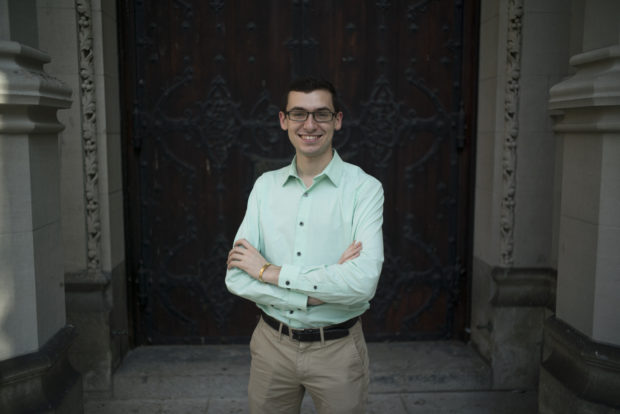
On a Sunday in early July, 10 minutes before the 10 a.m. mass, a murmur fills the Church of St. Paul the Apostle, a Roman Catholic parish in midtown Manhattan. It is not the distant sound of rain; It’s sunny outside. It’s not the whispers of the parishioners, as the pews have not yet been filled. It’s the murmur of a pipe organ’s blower.
Hidden below the main altar, it is a gigantic machine, more suited to a steamship than a church’s basement, and it’s pumped a steady amount of pressurized air into the lungs of the towering instrument standing still on the apse.
The murmur announces music to come, and signals that Dan Ficarri, a young, thin man wearing an ocean-blue shirt and dark-grey pants, is about to sit down at the organ’s console and play for Mass. When he does, the nave fills with music, and the organ begins to breathe.
Ficarri, 25, has been an organist since he was a boy. While other kids his age were playing ball in middle school, he was already playing music at funerals and weddings. He quickly learned to accompany the happiest and saddest moments of people’s lives.
“Playing music at church is different from making music in a concert hall or outside in an amphitheater,” he said. “There’s a certain solemnity and spiritual quality to it.”
Ficarri is quick to acknowledge that his profession can sometimes be seen as obscure. He's had to defend it, even from classical musicians who think that pipe organs are nothing more than old instruments to play slow hymns in half-empty churches.
Ficarri knows better. Organ music is alive and thriving. Later this month, he will become the next Associate Organist at the Episcopal Cathedral of St. John the Divine, the seat of New York’s Episcopal church in Morningside Heights.
Beyond denominations, Ficarri has faith in organ music.
Mozart called the pipe organ the king of instruments. Pipe organs are, in a way, omnipotent. They are capable of producing the softest and loudest of sounds, and the highest and lowest of pitches. Its pipes can be as large as trucks and as small as pencils. They can produce voices that mirror the world –there are even pipes meant to imitate a human singer’s voice. If needed, they can replace a full orchestra.
They are also kings in an atavistic sense. Up until the Industrial Revolution they were among the most complex machines ever built. They’ve also been around for a while, since Hellenistic times, well before the birth of Christ. Thanks to the powerful sounds they produce, pipe organs have been used in arenas, fairs, and theater halls, and it was not until fairly recently –five centuries, more or less– that pipe organs slowly found their ways into churches.
And a Catholic church in Franklin Park, a suburb north of Pittsburgh is where Ficarri expressed his talent for music. He played the violin there every Sunday and started playing the church’s digital organ around middle school. It was a tough place to learn the obscure art of organ playing, so he relied on his own work and instinct. He listened to recordings and watched people play on YouTube. It was a more n instructive than inspiring period.
Then, when he was 15 years old, Ficarri had an epiphany. Paul Jacobs, a Grammy Award-winning organist and Chair of Juilliard's organ department, performed at Pittsburgh’s Heinz Memorial Chapel. It was a French Romantic program, with pieces by Louis Vierne and Maurice Duruflé. Ficarri listened in awe. “I had a realization of what the organ could do.”
He found Jacobs’ email and contacted him. Jacobs, an organ apostle of sorts, offered to give Ficarri a lesson. In 2014, two years after he discovered the organ, Ficarri became a student at Juilliard, with a partial scholarship. He arrived at a small department, with only a dozen students, most of whom were already finishing their master’s degrees or getting their doctorates.
Ficarri was taken aback by the bright lights, big buildings and diversity of New York City. But the city also captivated Ficarri in a more personal sense. It is one of the most densely populated cities in the world when it comes to pipe organs. According to the American Guild of Organists’ New York City chapter, there are pipe organs in at least 100 Christian and Jewish houses of worship across the five boroughs, from the Armenian Church of America and the Church of Jesus Christ of Latter-Day Saints in Manhattan to Greek Orthodox churches in Queens and Moravian congregations in The Bronx.
The list is an impressive, multifaceted testament to the religious history of the city, born of waves of immigrants bringing their lives and faiths. A wealth of treasures, most of them hidden, was waiting for Ficarri to find them.
“One of the things that organists often do whenever they're in a new place is to go around and see and hear all of the different pipe organs,” he said. He found his favorite instruments at St. Mary the Virgin, a Catholic parish near Times Square, at St. Ignatius Loyola, another Catholic parish on the Upper East Side and at St. John the Divine.
Meanwhile, he found his first job as an organist at Hitchcock Presbyterian Church in suburban Scarsdale. His tenure there prepared him for his arrival to St Paul the Apostle in 2015.
Ficarri knows St. Paul the Apostle better than any other church in the city. It’s located on Columbus Avenue, two blocks away from Juilliard and Lincoln Center, and it was one of the first Catholic churches to welcome him as a gay man.
The church of St. Paul the Apostle, built in 1859, is administered by the Paulist Fathers, the first men’s religious order established in the United States, now known for its progressive stances. He plays for its parish regularly, when he’s not studying his craft.
The instrument at St. Paul is not old in comparison to other organs in the city, but a 1964 Möller with a four-keyboard console, plus the pedals. It’s a workhorse that, blowing, puffing and huffing, gets the musical job done. But Ficarri knows that it can falter at any moment. Parts of the organ have been held together by duct tape for years.
To the untrained ear, though, the organ sounds superb in the hands of Ficarri. Five minutes before a Mass begins, Ficarri sits down at the Möller’s console.
He starts with a prelude and an opening hymn. Then, following the reading of scriptures, he accompanies the congregation for the Kyrie, the Gloria, the responsorial psalm, and the Alleluia, which preceded the reading of the Gospel. After the homily, he plays the offertory hymn, the Sanctus and the Agnus Dei. He finishes with the postlude. The music fills the whole ceremony. And in turn, Ficcari wraps his entire mind and body around the music.
“You're always thinking about how you're operating the instrument mechanically, how you're executing the music, technically, with your fingers and with your feet,” he said. “Then, of course, you're thinking abstractly, musically, with your mind. And the brain obviously controls all of those things. Different parts of the body are always doing different tasks.”
Performing for mass is only a small portion of Ficarri’s duties as an organist. He also conducts the choir, planned weddings and funerals, and organized concerts.
Ficarri plays, but he also listens: both to the capricious Möller organ –which needs constant care and calibration– and to his fellow musicians, as well as to the church’s parishioners.
“He’s incredibly easy to work with,” said Luisa Torres, a soprano and former cantor at St. Paul. She now sings for the Archdiocese of Newark. “He anticipates where I’m going, and I know where he’s going.”
For a recent funeral at St. Paul the Apostle, he sat down with the family members of the deceased. He talked to them about the different options of music he could play, and then they shared with him the music that was special to the deceased. “I worked with them on planning something that was meaningful to them,” he said.
In the last week of July, shortly before finishing his tenure at St. Paul, Ficarri got a call from Kent Tritle, the Director of Cathedral Music and Organist at the Cathedral of St. John the Divine, in uptown Manhattan. He wanted Ficarri to audition for associate organist. He got the job.
“I'm still in disbelief,” he said. “It's as wonderful an opportunity as I could have ever imagined.” He will start his tenure on August 20.
According to Paul Jacobs, Ficarri's former teacher at Juilliard, to be appointed Associate Organist at St. John the DIvine is an honor. The Episcopal church is a New York City landmark and one of the most famous cathedrals in the world.
“Involvement in such a robust, visible music program will require extraordinary musical and personal skills,” said Jacobs. “Fortunately, Dan possesses them."
Juilliard organ students hold the strongest record for job placement immediately upon graduation. Some of them go to teach at college level, and others are appointed to posts at houses of worship in the United States and abroad. One year after graduating from Juilliard, Ficarri got one of the best positions available.
While happy for the opportunity brought by St. John, Ficarri has never been overly worried about the prospects of finding a new job.
"Obviously, everybody has certain worries and anxieties," he said. "But the perk to being an artist is that when you're in doubt, you just create."
Indeed, Ficarri decided to leave St. Paul to bring balance to a prolific and versatile career. He performs regularly, his work is published by Morning Star and E.C. Schirmer, and he self- publishes through Sheet Music Plus, an online retailer of sheet music.
He also writes organ pieces on commission for churches of all denominations.
"I try to make music that is inviting and not something that's just for an exclusive group or only speaks to people of a certain kind or a certain background or religion."
As a church organist, he knows that the music he plays is universal.
“It creates incredible vibrations in the building,” he said. “And whether you're conscious of it or not, you're always surrounded by it, and can feel to a certain extent those vibrations. There's a mystical quality to the organ because it can be incredibly loud. For a long time in history it was one of the loudest sounds that anyone ever heard. And while it's being played, outside of the keys moving, the pipes are just standing still.”
And perhaps that’s why, after the mass had ended last month and people had left the building, Ficarri kept playing the old, puffing Möller organ. After all, for him, playing is a matter of faith.

